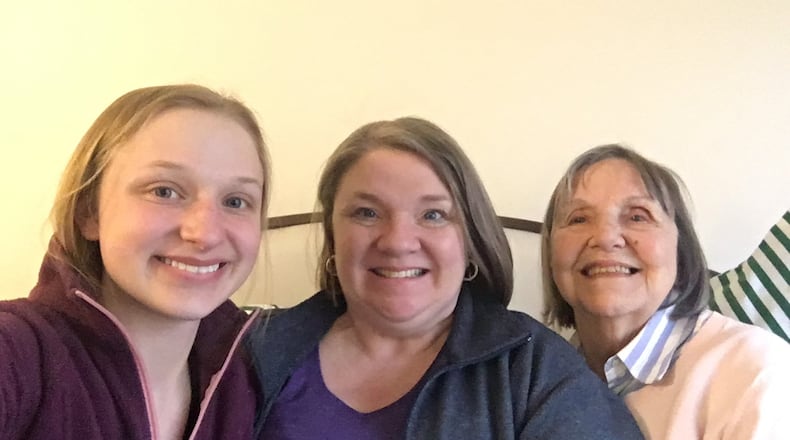Crauder is among an estimated 210,000 Ohioans living with Alzheimer’s and the coronavirus outbreak has been disruptive for both them and the estimated 597,000 Ohioans who are their caregivers.
Visitors have been restricted from nursing homes and assisted living facilities. Adult day centers and senior centers are closed. Restaurants and many other ways to get out of the house are closed.
MORE: Coronavirus in nursing homes: ‘We are going to see deaths’
“To have their routine broken up can be hard,” said Rebecca Hall, Director of Programs for the Miami Valley chapter of the Alzheimer’s Association.
The chapter has been working to provide support groups, education programs and care consultations for people at home and held a Facebook Live Q&A for caregiver questions. The 24/7 helpline at 1-800-272-3900 is still operating for support, referrals and individual care planning over the phone.
Life with Alzheimer’s or as a caregiver for someone with Alzheimer’s can already be isolating and that has heightened for many people now that everyone has to stay apart to slow the spread of the coronavirus.
Coronavirus: Complete Coverage
Laurel Thompson said she and her husband Eric who is in the early stages of Alzheimer’s is very personable and wants to go to restaurants and get out, but it’s hard to remember to distance himself. As an essential worker, Thompson is still heading into work and has been leaving notes around the house to remind him to stay inside and that she’s trying to protect him.
“It’s probably good for him to be out and get out for a walk but I don’t want him out because he’d probably see someone and try to shake their hands because he’s very personable,” Thompson said.
The Alzheimer’s Association local chapter already had a phone support group for caregivers the first Monday of each month at 7 p.m., and they are scheduling more phone support group days and times.
Bowman said these support groups were life changing, because caregiving can make you feel alone. At support groups, she was able to be around other people who understood because they have been through similar experiences and stages.
“When I went for the first time to a support group, I cried the whole time, because I didn’t think anybody understood what it was. Because you love this person and they drive you absolutely crazy and ask you the same question every 20 seconds,” she said.
Coronavirus: This Ohio innovation is capturing the nation’s attention
Both Bowman and Thompson said it’s important to check in on caregivers and see if they what they need help with.
Hall said that people’s natural inclination can be to propose solutions or jump in and give advice to caregivers, but it can be more helpful just to reach out and listen.
“I think the most important thing is to try to just be there for that person and just listen and see if they just need to talk things through,” Hall said.
Bowman said it can be frustrating when people ask “What are you doing for yourself?” to a caregiver who is overwhelmed trying to meet the needs of a person in their life with dementia. During this outbreak, and in general, she said it is much more helpful to ask the caregiver in your life what they need and if you can help them with that need, such as bringing over food or puzzles.
As Bowman noted, normally senior living communities have volunteer groups and families stopping by, which helps with the day to day, and now it’s just the staff handling all the work.
“They deserve major, major gold stars. I don’t know what we can do to thank them enough for getting our people through this,” Bowman said.
Some other tips from the association include:
• Call your health care provider about a telehealth appointment. For the pandemic, Medicare recently expanded telehealth benefits for phone and video calls so more people can get care while still at home.
• Unless the person is having difficulty breathing or a very high fever, it is recommended they call their health care provider instead of going directly to an emergency room, potentially avoiding a trip to the hospital.
• For people with a loved one living in a nursing home or assisted living community, call and check on the facility’s procedures for managing COVID-19 risk. Ensure they have your emergency contact information and the information of another family member or friend as a backup.
• People living with dementia can have increased confusion. Extra reminders and written reminders can help during this time, such as signs in the bathroom and elsewhere to remind people with dementia to wash their hands with soap for 20 seconds.
• Ask your pharmacist or doctor about filling prescriptions for a greater number of days to reduce trips to the pharmacy.
• For primary caregivers, think ahead and make alternative plans for care management in the event of illness.
How to get help
Phone support is available 24/7 through the Alzheimer’s Association. During weekday office hours, call 937-291-3332. After hours and weekends, call 1-800-272-3900. You can get information, support, referrals to resources, and can ask to schedule an appointment with a local social worker over the phone.
The local chapter already had a phone support group for caregivers the first Monday of each month at 7 p.m., and they are scheduling more phone support group days and times. Contact Dawn Boroff at 937-610-7016 to register.
The chapter also sharing resources and virtual education at facebook.com/alzdayton.
About the Author

